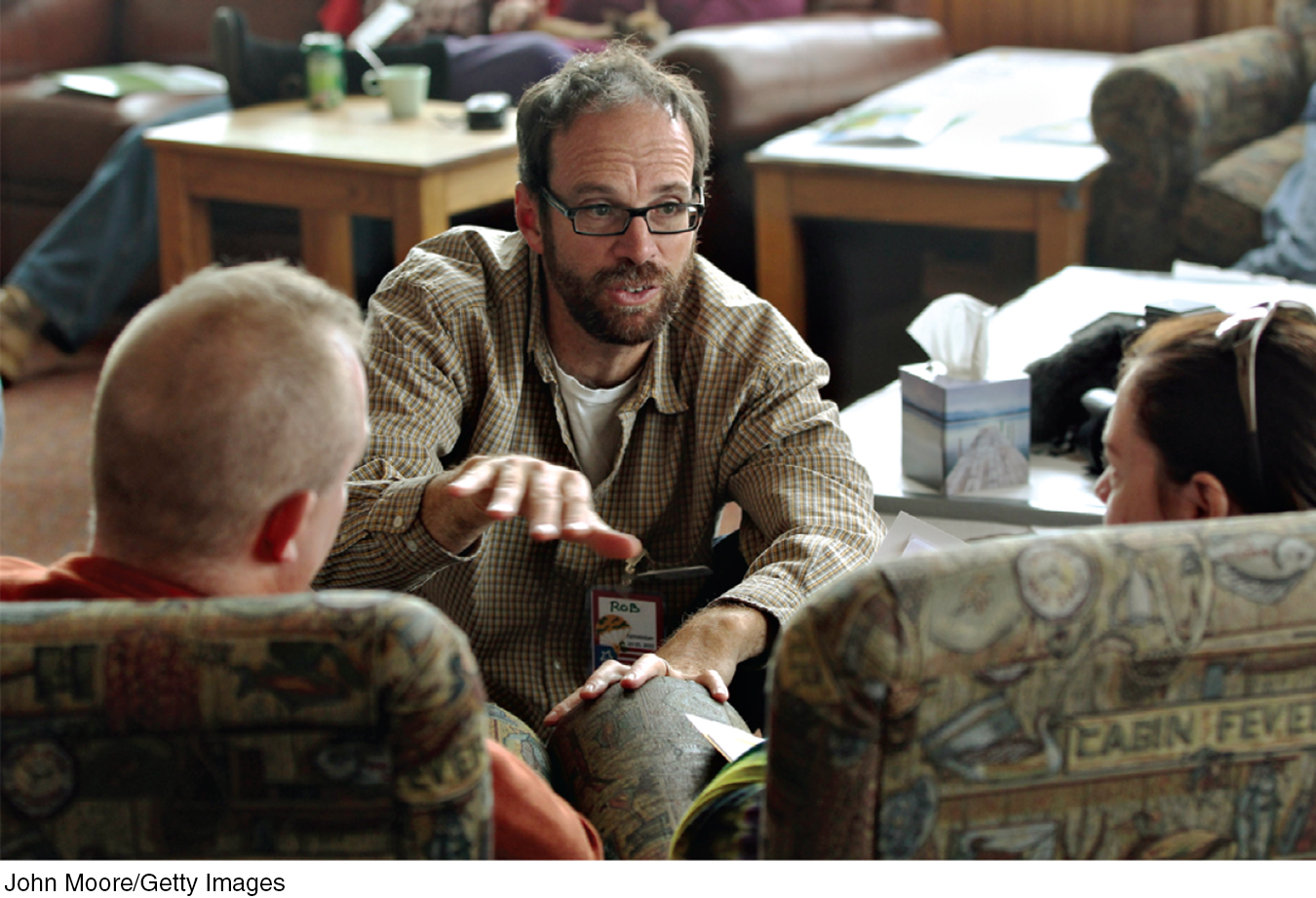44.6 Group and Family Therapies
582
44-
Group Therapy
group therapy therapy conducted with groups rather than individuals, permitting therapeutic benefits from group interaction.
Except for traditional psychoanalysis, most therapies may also occur in small groups. Group therapy does not provide the same degree of therapist involvement with each client. However, it offers many benefits:
It saves therapists’ time and clients’ money, often with no less effectiveness than individual therapy (Fuhriman & Burlingame, 1994).
It offers a social laboratory for exploring social behaviors and developing social skills. Therapists frequently suggest group therapy for people experiencing frequent conflicts or whose behavior distresses others. For up to 90 minutes weekly, the therapist guides people’s interactions as they discuss issues and try out new behaviors.
It enables people to see that others share their problems. It can be a relief to discover that you are not alone—
to learn that others, despite their composure, experience some of the same troublesome feelings and behaviors. It provides feedback as clients try out new ways of behaving. Hearing that you look poised, even though you feel anxious and self-
conscious, can be reassuring.
Family Therapy
family therapy therapy that treats the family as a system. Views an individual’s unwanted behaviors as influenced by, or directed at, other family members.
One special type of group interaction, family therapy, assumes that no person is an island. We live and grow in relation to others, especially our families, yet we also work to find an identity outside of our family. These two opposing tendencies can create stress for both the individual and the family.

Unlike most psychotherapy, which focuses on what happens inside the person’s own skin, family therapists work with multiple family members to heal relationships and to mobilize family resources. They tend to view the family as a system in which each person’s actions trigger reactions from others, and they help family members discover their role within their family’s social system. A child’s rebellion, for example, affects and is affected by other family tensions. Therapists also attempt—
Self-
More than 100 million Americans belong to small religious, interest, or support groups that meet regularly—
The grandparent of support groups, Alcoholics Anonymous (AA), reports having 2.1 million members in 115,000 groups worldwide. Its famous 12-
583
With more than 2 million members worldwide, AA is said to be “the largest organization on Earth that nobody wanted to join” (Finlay, 2000).
 To review the aims and techniques of different psychotherapies, and assess your ability to recognize excerpts from each, visit LaunchPad’s PsychSim 6: Mystery Therapist.
To review the aims and techniques of different psychotherapies, and assess your ability to recognize excerpts from each, visit LaunchPad’s PsychSim 6: Mystery Therapist.
In an individualist age, with more and more people living alone or feeling isolated, the popularity of support groups—
* * *
For a synopsis of these modern psychotherapies, see TABLE 44.2.
Comparing Modern Psychotherapies
| Therapy | Presumed Problem | Therapy Aim | Therapy Technique |
|---|---|---|---|
| Psychodynamic | Unconscious conflicts from childhood experiences | Reduce anxiety through self- |
Interpret patients’ memories and feelings. |
| Client- |
Barriers to self- |
Enable growth via unconditional positive regard, genuineness, acceptance, and empathy. | Listen actively and reflect clients’ feelings. |
| Behavior | Dysfunctional behaviors | Learn adaptive behaviors; extinguish problem ones. | Use classical conditioning (via exposure or aversion therapy) or operant conditioning (as in token economies). |
| Cognitive | Negative, self- |
Promote healthier thinking and self- |
Train people to dispute negative thoughts and attributions. |
| Cognitive- |
Self- |
Promote healthier thinking and adaptive behaviors. | Train people to counter self- |
| Group and family | Stressful relationships | Heal relationships. | Develop an understanding of family and other social systems, explore roles, and improve communication. |